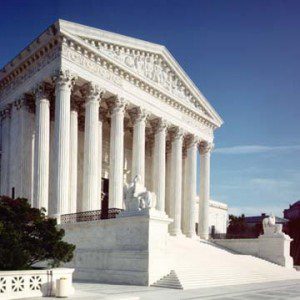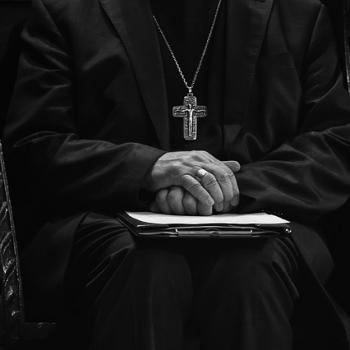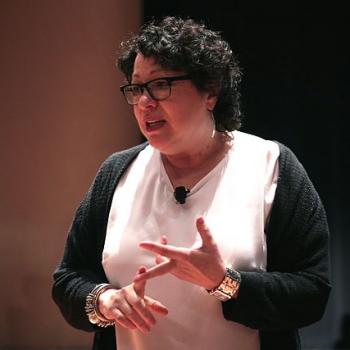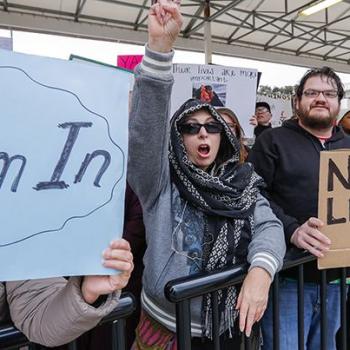
You know, those darn Muslims. Making trouble when they should be quiet, asking for stuff they shouldn’t be asking for – them and their creeping shariah! Ok, that is sarcasm, in case you didn’t get it. I’m thinking that much more R-rated versions of what I just wrote is what some folks must be thinking today in wake of the Supreme Court’s decision favor of Gregory Holt in Holt v. Hobbes (or officially Gregory Houston Holt, AKA Abdul Maalik Muhammad, petitioner v. Ray Hobbs, director, Arkansas Department of Correction). Holt is a Muslim prisoner who wanted to keep his half-inch beard.
Arkansas is one of the few states that bans beards of any length on prisoners for security reasons. It’s the minority of states that does this — more than 40 states allows for beards (according to what I read over on The Friendly Atheist blog today).
Justice Alito delivered the unanimous decision of the Supreme Court today, writing:
We hold that the Department’s policy, as applied in this case, violates the Religious Land Use and Institutionalized Persons Act of 2000 (RLUIPA), 114 Stat. 803, 42 U. S. C. §2000cc et eq., which prohibits a state or local government from taking any action that substantially burdens the religious exercise of an institutionalized person unless the government demonstrates that the action constitutes the least restrictive means of furthering a compelling governmental interest.
In regards to the Arkansas Department of Corrections forbidding beards because of security risks, the Court added that:
Although we do not question the importance of the Department’s interests in stopping the flow of contraband and facilitating prisoner identification, we do doubt whether the prohibition against petitioner’s beard furthers its compelling interest about contraband. And we conclude that the Department has failed to show that its policy is the least restrictive means of furthering its compelling interests. We thus reverse the decision of the United States Court of Appeals for the Eighth Circuit.
And, knowing that folks would bring up the Supreme Court’s decision in the Hobby Lobby case last year, the court addressed that too. Justice Ruth Bader Ginsburg said that accommodating a petitioner’s religious beliefs in this case wouldn’t “detrimentally affect others who do not s hare petitioner’s belief.”
Sure, I’m glad Holt got to grow/keep his beard, just like I’m glad when any Muslim woman is able to wear her headscarf freely because she believes she is doing it as a requirement of her faith. It’s fascinating to read the Supreme Court’s decision in this, and how they outline what the District Court did before them by way of accommodating the prisoner’s requests to be able to live by his religion, which was a significant amount, from being provided with a prayer rug and a special diet to being allowed to receive Islamic materials, corresponding with an Islamic adviser and being able to celebrate Muslim holidays.
I also thought about beards and Muslim men themselves – is it a hard and fast requirement? What do the various Islamic schools of thoughts say about beards, and how does that pertain to the Supreme Court’s overturning of the District Court’s decision? According to the written opinion:
Finally, the District Court went astray when it relied on petitioner’s testimony that not all Muslims believe that men must grow beards. Petitioner’s belief is by no means idiosyncratic. See Brief for Islamic Law Scholars as Amici Curiae 2 (“hadith requiring beards . . . are widely followed by observant Muslims across the various schools of Islam”). But even if it were, the protection of RLUIPA, no less than the guarantee of the Free Exercise Clause, is “not limited to beliefs which are shared by all of the members of a religious sect.” Thomas v. Review Bd. of Indiana Employment Security Div., 450 U. S. 707, 715–716 (1981).
You know, with all the issues and divisiveness, hatred and problems Muslims face in the United States, one has to look at the positives as well. Anyone can complain all the time about everything that is wrong (and yeah, there is a lot of wrong happening), but I like to also hold on to the good. Because we live in a democratic country, we can fight and petition for our right to practice our religion freely, as Muslims did last week when Duke University rescinded its decision to allow the adhan to be called from the bell tower of its chapel. My kids have attended public school for years, and every teacher has respected my request that the only eat halal, mom-approved food. If I don’t send lunch from home, their cafeterias usually have alternatives for them to eat. (Food for thought when I read about how a French National Front leader advised school canteens to tell Muslim students to “eat pork or go hungry” instead of accommodating religious diets.)
When I first began fasting in middle school back in the ’80s (and was the only Muslim in school), my gym teacher and principal listened to my mother and kindly allowed me to skip gym when fasting and hang out in the guidance counselors office during lunch if I wanted to. That was about 25 years ago. Tolerance and accommodations are even better now. A Muslim prisoner wanted to grow/keep a half-inch beard in accordance to what he felt was something he needed to do as part of his faith. Now he can.
Yes, there is a whole lot that is wrong — done to Muslims and done by Muslims. (Just like with everyone else in this world.) But there are good things too.














